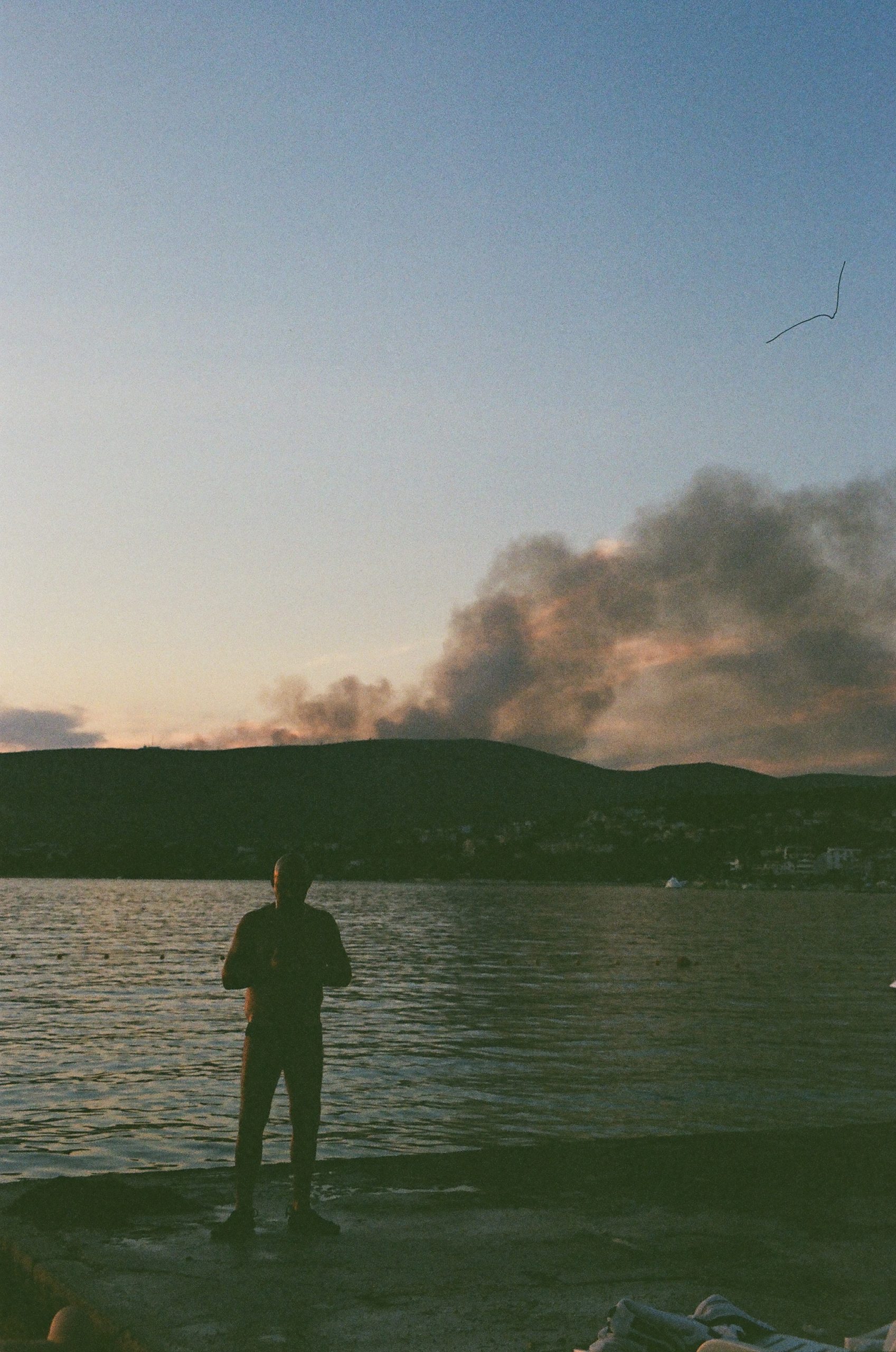
Among causing many physical damages to humans and their environment, the climate crisis is awfully influencing the mental health of many people as well. In recent years, especially the young people started seeking therapy in the hope of finding a solution for their environment-related anxiety.
Among causing many physical damages to humans and their environment, the climate crisis is awfully influencing the mental health of many people as well. In recent years, especially the young people started seeking therapy in the hope of finding a solution for their environment-related anxiety.

Photo by Sarah Laszlo

Photo by Sarah Laszlo
By causing sea-level rise, flooding, desertification, wildfires, air pollution, loss of biodiversity, and many other damages to Earth, the climate crisis is one of the greatest threats that humanity faces today. As some parts of the world are already becoming inhabitable, many people are getting displaced. Going a few steps further, the World Health Organisation estimates a rise of 250,000 excess deaths per year between 2030 and 2050 due to the effects of the climate crisis. Although 190 countries and the European Union agreed to come up with plans limiting the global warming to below 2 degrees Celsius with the Paris Agreement in 2015, they haven’t been successful so far. According to the latest report of Intergovernmental Panel on Climate Change (2021), as long as urgent and significant action isn’t taken by the governments, the goals set in the Paris Agreement will be far to reach, and humanity will face more catastrophes.
Along with the physical impacts on Earth and people, the climate crisis also impacts the mental health of many people. If you haven’t become numb to the topic of environment by now, you probably felt uncomfortable while reading the previous paragraph, imagining all the catastrophic scenarios that are the results of the climate crisis. These worries about the climate crisis and the future of our planet are rapidly increasing, especially among younger people. Although most of these cases are non-pathological (Panu, 2020), the increasing number of people seeking therapy for climate-related anxiety gave rise to a new term among psychologists: Eco-anxiety, the chronic fear of environmental doom (APA, 2017).
“as the climate crisis threat is real, we should not convince anyone of its absence, like we treat other anxiety disorders”
Anxiety is experienced when our brain perceives a threat to its survival and makes the body respond in a fight, flight, or freeze-reaction. In pathological anxiety, these threats are often irrational and can be treated with various psychological interventions. What makes eco-anxiety different from the ‘regular’ anxiety is that this time the threat is real, and it indeed poses a challenge to human survival. Symptoms that are present are feelings of loss and guilt, frustration towards people who do not act on the problem, existential dread, sleep problems, decreased attentional skills, and other symptoms that are usually present in anxiety disorders (APA, 2017). Moreover, eco-anxiety influences people in different ways. The ones who are directly affected by the climate crisis by losing their homes, income (e.g., farmers) or experiencing a natural disaster, are more anxious about what they will do in the near future. Some of them also show signs of post-traumatic stress disorder. On the other hand, people who aren’t directly affected (yet) are more anxious about the uncertainty of what the future holds for them. This is especially the case for young people, who are unable to predict the state of the world in their adulthood. Recently, it was proposed by Kaplan (2020) that what these people experience might be a pre-traumatic stress response.
Treating eco-anxiety is especially important because it might cause avoidance behavior, which in turn hinders people from taking action against the climate crisis (Stanley et al., 2021). And as the climate crisis threat is real, we should not convince anyone of its absence, like we treat other anxiety disorders. What is the solution for eco-anxiety then? Although the literature is still limited, there are already several interventions proposed by clinical psychologists (Baudon & Jachen, 2021). The first one is fostering one’s inner resilience through cognitive interventions. These interventions aim for the client to shift from a catastrophizing perspective to a more manageable frame. This helps the clients to formulate a more realistic and attainable goal within their skills and focus on what they can contribute to the solution, rather than trying to handle the whole problem by themselves. The client doesn’t see the issue as ‘uncontrollable’ any longer, retrieves their sense of agency, and has increased self-efficacy. Another great way of empowering one’s resilience is through meaning-focused and existential interventions. It was found that when young people find meaning in their pro-environmental actions, they have more hope toward the future and more trust in people like scientists and environmental activists. This meaning-focused approach to climate crisis is also associated with better well-being and engagement with taking action (Ojala, 2019). Moreover, clinical psychologists noted that eco-anxiety can be treated similarly to anticipatory loss. In this case, they are encouraged to experience feelings of grief, and supported so that they don’t fall into denial, dissociation, or other flight responses. Their feelings of loss are valid, and having a space to experience their grief, whether it is about the environment directly or about their future life, homeland, etc., is very important.
“ the petroleum industry tries to control the environmental narrative by centering it around individual actions and distracting people from finding out where the actual change should happen”
Apart from these individual solutions, group interventions are also shown as highly beneficial. Emotional support groups where people discuss their experience of eco-anxiety are noted as very strong emotional containers (Baudon & Jachen, 2021). Moreover, people are greatly encouraged to join environmental organisations in order to link with a like-minded group, offering them a safe space to discuss environmental issues, and to take action together. As the climate crisis isn’t a problem that can be solved by single individuals, getting together in a group and having a feeling of collective commitment helps people deal with their environmental anxiety.
Even though these treatments of eco-anxiety are beneficial, it is much more sensible to have preventive measures against it. Only 100 fossil fuel companies alone are responsible for more than 70% of gas emissions (CDP, 2017). And multiple studies show that this industry tries to control the environmental narrative by centering it around individual actions and distracting people from finding out where the actual change should happen, in order to protect their industry from economical damage (Eaton & Day, 2020). Considering the carbon footprint of individual people compared to the oil industry, the guilt that some people feel is out of proportion. It is highly unfair to put the burden on millions of individuals, while the change that multiple companies could make would be significantly more impactful on saving the environment. It would also be beneficial for individuals to keep this in mind when they feel guilty about their own carbon footprint, or while planning their environmentalist actions. Activism and collective action might make more significant influence than the reduced use of reusable bags.
To conclude, more and more people, especially the young, are getting concerned about the future of the Earth. Climate crisis has a significant negative impact on people’s well-being, and eco-anxiety is concerning. So far, it seems like the best way to combat this and restore hope is to understand what actually fuels the climate crisis, and how people can contribute to the solution within their abilities. These abilities might include taking part in voting, organising events to raise awareness, living more eco-friendly in one’s own way, and many other actions. Needless to say, the first thing we need in saving the environment is healthy minds. Therefore, caring for our mental health is as important as taking actions against the climate crisis. <<
References
– Baudon, P., & Jachens, L. (2021). A scoping review of interventions for the treatment of eco-anxiety. International Journal of Environmental Research and Public Health, 18(18), 9636.
– Eaton, E. M., & Day, N. A. (2020). Petro-pedagogy: fossil fuel interests and the obstruction of climate justice in public education. Environmental Education Research, 26(4), 457-473.
– Kaplan, E. A. (2020). Is climate-related pre-traumatic stress syndrome a real condition? American Imago, 77(1), 81–104.
– Ojala, M. (2018). Eco-anxiety. Rsa Journal, 164(4 (5576), 10-15.
– Panu, P. (2020). Anxiety and the ecological crisis: An analysis of eco-anxiety and climate anxiety. Sustainability, 12(19), 7836.
– Stanley, S. K., Hogg, T. L., Leviston, Z., & Walker, I. (2021). From anger to action: Differential impacts of eco-anxiety, eco-depression, and eco-anger on climate action and wellbeing. The Journal of Climate Change and Health, 1, 100003.
By causing sea-level rise, flooding, desertification, wildfires, air pollution, loss of biodiversity, and many other damages to Earth, the climate crisis is one of the greatest threats that humanity faces today. As some parts of the world are already becoming inhabitable, many people are getting displaced. Going a few steps further, the World Health Organisation estimates a rise of 250,000 excess deaths per year between 2030 and 2050 due to the effects of the climate crisis. Although 190 countries and the European Union agreed to come up with plans limiting the global warming to below 2 degrees Celsius with the Paris Agreement in 2015, they haven’t been successful so far. According to the latest report of Intergovernmental Panel on Climate Change (2021), as long as urgent and significant action isn’t taken by the governments, the goals set in the Paris Agreement will be far to reach, and humanity will face more catastrophes.
Along with the physical impacts on Earth and people, the climate crisis also impacts the mental health of many people. If you haven’t become numb to the topic of environment by now, you probably felt uncomfortable while reading the previous paragraph, imagining all the catastrophic scenarios that are the results of the climate crisis. These worries about the climate crisis and the future of our planet are rapidly increasing, especially among younger people. Although most of these cases are non-pathological (Panu, 2020), the increasing number of people seeking therapy for climate-related anxiety gave rise to a new term among psychologists: Eco-anxiety, the chronic fear of environmental doom (APA, 2017).
“as the climate crisis threat is real, we should not convince anyone of its absence, like we treat other anxiety disorders”
Anxiety is experienced when our brain perceives a threat to its survival and makes the body respond in a fight, flight, or freeze-reaction. In pathological anxiety, these threats are often irrational and can be treated with various psychological interventions. What makes eco-anxiety different from the ‘regular’ anxiety is that this time the threat is real, and it indeed poses a challenge to human survival. Symptoms that are present are feelings of loss and guilt, frustration towards people who do not act on the problem, existential dread, sleep problems, decreased attentional skills, and other symptoms that are usually present in anxiety disorders (APA, 2017). Moreover, eco-anxiety influences people in different ways. The ones who are directly affected by the climate crisis by losing their homes, income (e.g., farmers) or experiencing a natural disaster, are more anxious about what they will do in the near future. Some of them also show signs of post-traumatic stress disorder. On the other hand, people who aren’t directly affected (yet) are more anxious about the uncertainty of what the future holds for them. This is especially the case for young people, who are unable to predict the state of the world in their adulthood. Recently, it was proposed by Kaplan (2020) that what these people experience might be a pre-traumatic stress response.
Treating eco-anxiety is especially important because it might cause avoidance behavior, which in turn hinders people from taking action against the climate crisis (Stanley et al., 2021). And as the climate crisis threat is real, we should not convince anyone of its absence, like we treat other anxiety disorders. What is the solution for eco-anxiety then? Although the literature is still limited, there are already several interventions proposed by clinical psychologists (Baudon & Jachen, 2021). The first one is fostering one’s inner resilience through cognitive interventions. These interventions aim for the client to shift from a catastrophizing perspective to a more manageable frame. This helps the clients to formulate a more realistic and attainable goal within their skills and focus on what they can contribute to the solution, rather than trying to handle the whole problem by themselves. The client doesn’t see the issue as ‘uncontrollable’ any longer, retrieves their sense of agency, and has increased self-efficacy. Another great way of empowering one’s resilience is through meaning-focused and existential interventions. It was found that when young people find meaning in their pro-environmental actions, they have more hope toward the future and more trust in people like scientists and environmental activists. This meaning-focused approach to climate crisis is also associated with better well-being and engagement with taking action (Ojala, 2019). Moreover, clinical psychologists noted that eco-anxiety can be treated similarly to anticipatory loss. In this case, they are encouraged to experience feelings of grief, and supported so that they don’t fall into denial, dissociation, or other flight responses. Their feelings of loss are valid, and having a space to experience their grief, whether it is about the environment directly or about their future life, homeland, etc., is very important.
“ the petroleum industry tries to control the environmental narrative by centering it around individual actions and distracting people from finding out where the actual change should happen”
Apart from these individual solutions, group interventions are also shown as highly beneficial. Emotional support groups where people discuss their experience of eco-anxiety are noted as very strong emotional containers (Baudon & Jachen, 2021). Moreover, people are greatly encouraged to join environmental organisations in order to link with a like-minded group, offering them a safe space to discuss environmental issues, and to take action together. As the climate crisis isn’t a problem that can be solved by single individuals, getting together in a group and having a feeling of collective commitment helps people deal with their environmental anxiety.
Even though these treatments of eco-anxiety are beneficial, it is much more sensible to have preventive measures against it. Only 100 fossil fuel companies alone are responsible for more than 70% of gas emissions (CDP, 2017). And multiple studies show that this industry tries to control the environmental narrative by centering it around individual actions and distracting people from finding out where the actual change should happen, in order to protect their industry from economical damage (Eaton & Day, 2020). Considering the carbon footprint of individual people compared to the oil industry, the guilt that some people feel is out of proportion. It is highly unfair to put the burden on millions of individuals, while the change that multiple companies could make would be significantly more impactful on saving the environment. It would also be beneficial for individuals to keep this in mind when they feel guilty about their own carbon footprint, or while planning their environmentalist actions. Activism and collective action might make more significant influence than the reduced use of reusable bags.
To conclude, more and more people, especially the young, are getting concerned about the future of the Earth. Climate crisis has a significant negative impact on people’s well-being, and eco-anxiety is concerning. So far, it seems like the best way to combat this and restore hope is to understand what actually fuels the climate crisis, and how people can contribute to the solution within their abilities. These abilities might include taking part in voting, organising events to raise awareness, living more eco-friendly in one’s own way, and many other actions. Needless to say, the first thing we need in saving the environment is healthy minds. Therefore, caring for our mental health is as important as taking actions against the climate crisis. <<


